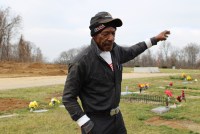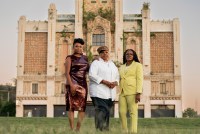If You’re Pregnant and Uninsured, Medicaid Might Be Your Answer
Prenatal care can make a huge difference to the long-term health of both the parent and baby. Every state offers health coverage to lower-income pregnant women who might otherwise go uninsured.
Si estás embarazada y no tienes seguro de salud, Medicaid podría ser la solución
Todos los estados ofrecen cobertura de Medicaid a las mujeres embarazadas que cumplen con ciertos requisitos de ingresos. Pero cambia dependiendo del estado.
A Surgical Team Was About To Harvest This Man’s Organs — Until His Doctor Intervened
A 22-year-old was shot in the head in St. Louis. As a surgical team prepared him for organ harvesting, his neurosurgeon raced to the operating room to stop it, saying that his patient had a chance at life. Today, the man is alive, sharing his story.
An Insurer Agreed To Cover Her Surgery. A Politician’s Nudge Got the Bills Paid.
A kindergartner in Missouri needed eye surgery. Her insurer granted approval for her to see a specialist nearby, yet her parents were confused when they still owed more than $13,000. Then her uncle, a former state senator, reached out to a colleague who contacted the hospital and the insurer.
Volunteers Help Tornado-Hit St. Louis Amid Wait for Federal Aid
As St. Louis deals with more than $1.6 billion in estimated property damage from the May 16 tornado, locals are pouring in to help the hard-hit area of North St. Louis. It’s unclear if residents can count on federal support as they rebuild.
Listen: Black Swimmers Make Waves Overcoming Fear and Old Perceptions
Segregation and lack of access have kept many Black Americans from learning to swim, which raises their risk of drowning. Groups across the country are working to teach more Black kids and adults the skills to save their lives, or someone else’s.
Magic Happens When Kids and Adults Learn To Swim. Tragedy Can Strike if They Don’t.
A swim team in North St. Louis combats the public health threat of drowning — especially among Black children and adults — by promoting water safety not just for its athletes but also their parents.
Listen: NPR and KFF Health News Explore How Racism and Violence Hurt Health
KFF Health News Midwest correspondent Cara Anthony and Emily Kwong, host of NPR’s podcast “Shortwave,” talk about Black families living in the aftermath of lynchings and police killings.
Watch: ‘Silence in Sikeston & The Effects of Racial Violence’
KFF Health News Midwest correspondent Cara Anthony talks about how racism affects health on Nine PBS’ “Listen, St. Louis with Carol Daniel,” stemming from her reporting for the “Silence in Sikeston” multimedia project, on the impact of a 1942 lynching and a 2020 police killing on a rural Missouri community.
Watch: ‘Breaking the Silence Is a Step’ — Beyond the Lens of ‘Silence in Sikeston’
KFF Health News Midwest correspondent Cara Anthony discusses her reporting for the “Silence in Sikeston” multimedia project, which explores the impact of a 1942 lynching and a 2020 police killing on a rural Missouri community — and what it led her to learn about her own family’s past.
Silence in Sikeston: Is There a Cure for Racism?
In the finale of “Silence in Sikeston,” Black residents organize a Juneteenth barbecue. The Department of Public Safety chief encourages officers to attend to build trust. But improving relations between Sikeston’s Black community and the police won’t be easy. Host Cara Anthony discusses the possibility of institutional change in Sikeston.
Silence in Sikeston: Trauma Lives in the Body
Denzel Taylor, a young Black father, moved from Chicago to Sikeston, Missouri, for a fresh start in life. There, he proposed to his girlfriend, started a family, and then, in April 2020, was fatally shot by police officers. Taylor had two young daughters and another on the way when he was killed. Pediatrician Rhea Boyd talks about how children process such loss.
Watch: What You Reveal, You Heal — Meeting the Makers of ‘Silence in Sikeston’
KFF Health News Midwest correspondent Cara Anthony sat down with WORLD executive producer Chris Hastings to discuss the origins of the “Silence in Sikeston” project, which explores the impact of a 1942 lynching and a 2020 police killing in the same rural Missouri community.
Watch: New Documentary Film Explores a Lynching and a Police Killing 78 Years Apart
The “Silence in Sikeston” documentary film explores how the nation’s first federally investigated lynching and a police killing 78 years apart haunt the same rural Missouri community. The film from KFF Health News and Retro Report explores the lasting impact of such trauma — and what it means to speak out about it.
Silence in Sikeston: Hush, Fix Your Face
In Episode 2 of the “Silence in Sikeston” podcast, host Cara Anthony speaks with Sikeston, Missouri, resident Larry McClellon, who grew up being told not to talk about the 1942 lynching of Cleo Wright. He is determined to break the cycle of silence in his community. Anthony also unearths a secret in her own family and grapples with the possible effects of intergenerational trauma.
No One Wants To Talk About Racial Trauma. Why My Family Broke Our Silence.
Every family has secrets. I spent the past few years reporting about racial violence in Sikeston, Missouri. Interviewing Black families there helped me uncover my family’s traumatic past, too.
Silence in Sikeston: Racism Can Make You Sick
The “Silence in Sikeston” podcast explores what it means to live with racism and violence, then charts the toll on health — from hives and high blood pressure to struggles with mental health. The deaths of two Black men killed nearly 80 years apart in the same Missouri community anchor a conversation about the public health consequences of systemic bias.
When Gun Violence Ends Young Lives, These Men Prepare the Graves
Just outside St. Louis, a cemetery for children sits on a hill. A wooden, weather-worn sign welcomes mourners to “Baby Land.” The gravediggers who made the special spot work quietly in the shadows.
Survivors of Gangs and Gun Violence, These Women Now Help Others Navigate Grief
As teens, these three women lived amid street gangs around East St Louis, Illinois. Now, as adults, they support the families who have lost loved ones to gun violence. And because of their past, some residents trust them more than they do the police.
Para combatir la violencia con armas de fuego, artista convierte las balas en arte
Según datos de los Centros para el Control y la Prevención de Enfermedades, a nivel nacional, más de 47,000 personas murieron por heridas de bala en 2021: la cifra más alta desde principios de la década de 1990.






















